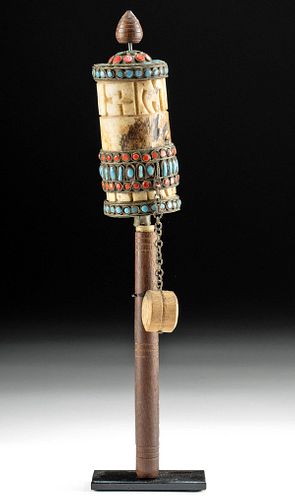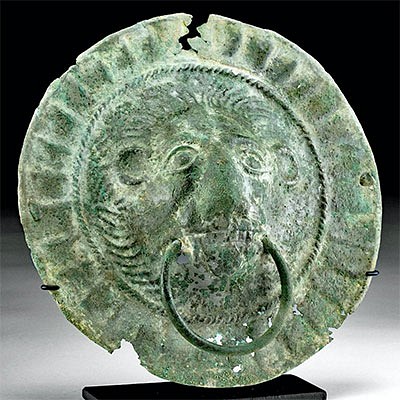19th C. Tibetan Bone, Brass, & Enamel Prayer Wheel
Lot 78
About Seller
Artemis Fine Arts
686 S Taylor Ave, Ste 106
Louisville, CO 80027
United States
Selling antiquities, ancient and ethnographic art online since 1993, Artemis Gallery specializes in Classical Antiquities (Egyptian, Greek, Roman, Near Eastern), Asian, Pre-Columbian, African / Tribal / Oceanographic art. Our extensive inventory includes pottery, stone, metal, wood, glass and textil...Read more
Categories
Estimate:
$1,100 - $1,650
Absentee vs Live bid
Two ways to bid:
- Leave a max absentee bid and the platform will bid on your behalf up to your maximum bid during the live auction.
- Bid live during the auction and your bids will be submitted real-time to the auctioneer.
Bid Increments
| Price | Bid Increment |
|---|---|
| $0 | $25 |
| $300 | $50 |
| $1,000 | $100 |
| $2,000 | $250 |
| $5,000 | $500 |
| $10,000 | $1,000 |
| $20,000 | $2,500 |
| $50,000 | $5,000 |
| $100,000 | $10,000 |
| $200,000 | $20,000 |
About Auction
By Artemis Fine Arts
Oct 14, 2021
Set Reminder
2021-10-14 10:00:00
2021-10-14 10:00:00
America/New_York
Bidsquare
Bidsquare : CLEARANCE | Ancient & Ethnographic Art
https://www.bidsquare.com/auctions/artemis-gallery/clearance-ancient-ethnographic-art-7705
Kick off fall with our clearance sale featuring discounted pricing and many new items! Asian art, Classical antiquities from Egypt, Greece, Italy, and the Near East...plus Pre-Columbian, Tribal, Russian Icons & Enamelware, Spanish Colonial, Fine Art, Fossils, more! Starting prices have been reduced Artemis Fine Arts info@artemisgallery.com
Kick off fall with our clearance sale featuring discounted pricing and many new items! Asian art, Classical antiquities from Egypt, Greece, Italy, and the Near East...plus Pre-Columbian, Tribal, Russian Icons & Enamelware, Spanish Colonial, Fine Art, Fossils, more! Starting prices have been reduced Artemis Fine Arts info@artemisgallery.com
- Lot Description
**Originally Listed At $600**
Central Asia, Tibet, ca. 19th to mid-20th century CE. A devotional prayer wheel for handheld use, made from bovine bone, glass, brass, and wood. The body is cylindrical piece of bone that is carved with upper and lower register of geometric motifs. Encircling the center is a brass band that is decorated with enamel inlays of red and blue. The base and top of the bone is capped by brass finials and a wooden knob atop a brass pin that extends through the bone and attaches to a wood handle. The brass finial cap can be shifted horizontally to reveal the interior and contained inside the bone cylinder is an original paper prayer stamped in black ink. The drum-like body has an attached chain with a wooden disc on its end for making sound when rotated. Spinning the wheel is believed to have the same effect as chanting the prayer. Size: 10.25" L x 1.6" W (26 cm x 4.1 cm); 10.5" H (26.7 cm) on included custom stand.
Provenance: private Hawaii, USA collection; ex-Robert Sommers collection, California, USA
All items legal to buy/sell under U.S. Statute covering cultural patrimony Code 2600, CHAPTER 14, and are guaranteed to be as described or your money back.
A Certificate of Authenticity will accompany all winning bids.
PLEASE NOTE: Due to recent increases of shipments being seized by Australian & German customs (even for items with pre-UNESCO provenance), we will no longer ship most antiquities and ancient Chinese art to Australia & Germany. For categories of items that are acceptable to ship to Australia or Germany, please contact us directly or work with your local customs brokerage firm.
Display stands not described as included/custom in the item description are for photography purposes only and will not be included with the item upon shipping.
#164581The brass finial, wood knob, central brass band, and lower brass cap are all loose and not completely secure. Wooden handle is also loose. All is stable enough to stand upright and display, but not recommended for use. Abrasions to bone and wood. Chips to enamel inlays. Patina on brass. Prayer is on delicate paper and cannot be easily accessed and likely dates to 20th century.Condition
- Shipping Info
-
All shipping is handled in-house for your convenience. Your invoice from Artemis Gallery will include shipping calculation instructions. If in doubt, please inquire BEFORE bidding for estimated shipping costs for individual items.
-
- Buyer's Premium



 EUR
EUR CAD
CAD AUD
AUD GBP
GBP MXN
MXN HKD
HKD CNY
CNY MYR
MYR SEK
SEK SGD
SGD CHF
CHF THB
THB













